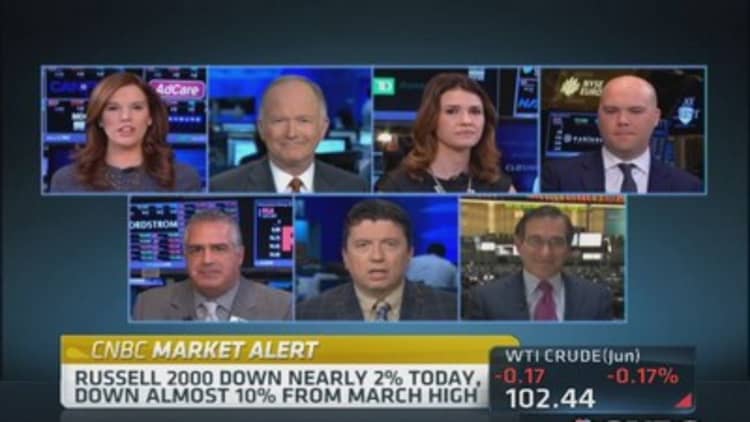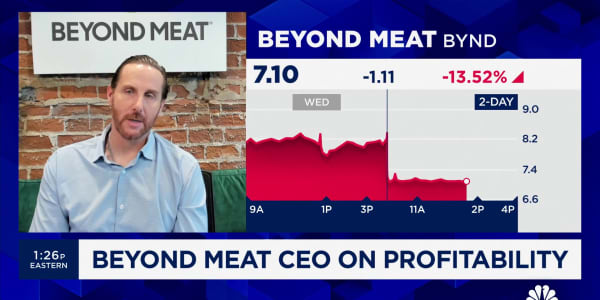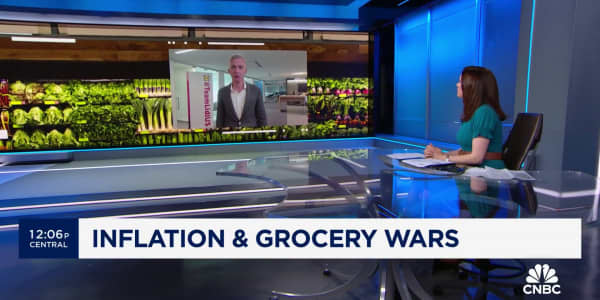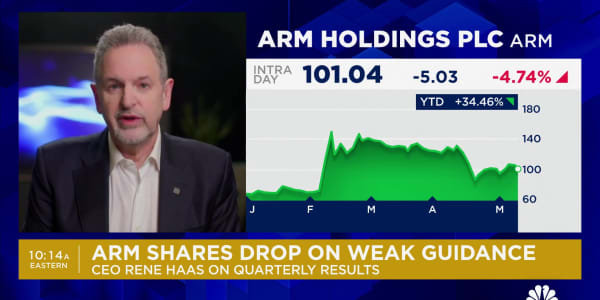
Correction is the call du jour in the stock market these days, and it's getting more and more converts.
A bevy of high-profile names have warned lately that the market is on the doorstep of a major move lower. From long-term market bulls such as Piper Jaffray to short-term traders such as Dennis Gartman, expectations are high that the major averages are poised for a big dip, with calls varying from 10 percent or so all the way up to 25 percent.
After a move higher of 180 percent since the March 2009 lows and no true market correction—historically regarded as a downturn of 10 percent or more—for two years, the current round of dire predictions, as much as anything, may be a case of wishful thinking for investors looking for a better entry point.
"You've got a lot of retail investors who have not been in the market," said Quincy Krosby, chief market strategist at Prudential Annuities. "Many of those retail investors would like to see this market pull back, clean up and then (they will) deploy assets...I don't think they want to come into a market that has reached new highs."
Read MoreWhy you need to watch the 10-year this week
Those wishing the market would correct have plenty of allies. Among them are:
Peter Boockvar, chief market analyst at the Lindsey Group, told CNBC that the end of the Federal Reserve's monthly bond-buying program—quantitative easing—will bring a drop of 20 percent or more. The three waves of the central bank's so-called money printing have coincided almost perfectly with the market's gyrations over the past five years, and the program is likely to end in October, at least for now.
Ralpha Acampora, a technical analyst with a strong reputation on Wall Street, sees a long-term bull market but a near-term bear drop of about 25 percent, causing him to have a "sick feeling" about the current state of the market.
Dennis Gartman, hedge fund manager and author of the widely followed Gartman Letter, said a correction is coming because of technical signals given between "the broad market and the narrow."
"We draw attention yet again...that the very narrowly defined Dow Industrials index keeps pushing to new highs while the very much broader keeps pushing to new lows; that the trend of the former is upward while the trend of the latter is down," Gartman wrote Tuesday. "We are again reminded of what happened back in the early '70s when investment capital ran to the Dow and to the 'Nifty Fifty' while the rest of the markets were languishing and/or were actually falling rather badly. This resolved itself in ill for all involved for eventually even the Dow and the Nifty Fifty stocks succumbed to selling."
And there's more cause for concern: Normally bullish hedge fund manager David Tepper rattled the market when, at last week's SkyBridge Capital's SALT conference in Las Vegas, he said he was reducing his equity exposure. At the same conference, the Carlyle Group's David Rubenstein voiced his opinion that "markets are not cheap."
Read MoreTepper on the market: 'Don't be too fricking long'
Earlier this month, Piper Jaffray noted a "stealth correction" that will take investors by surprise, with the dropping as much as 15 percent before rebounding strongly to end of the year.
And, of course, there's the perpetually bearish Marc Faber, who warned recently that the economy is in for a worse financial crisis than the panic of 2008.
Read MoreI'm worried about a crisis bigger than 2008: Faber
In fact, the correction anticipation trade—which is certainly nothing new since the five-year bull market began—is getting so crowded that it's causing some to doubt it will come.
"Everyone in the industry has been gearing up for the 'this is it' moment, and one of the reasons we haven't had a big hit since 2012 is because so many people are already prepared for it," said Mitch Goldberg, president of ClientFirst Strategy. "When somebody comes out with a dire call or very negative call, they have probably already adjusted their positioning before they make that call. So many people are calling for a correction that cash already has been raised."
Indeed, investment pros have been raising cash in a big way, with levels at 5 percent of portfolios, the highest since June 2012, according to the most recent Bank of America Merrill Lynch Fund Manager Survey.
Of all the correction views, Boockvar's end-of-QE warning probably has the most traction among investors: The market is clearly worried about what will happen without Fed intervention and is awaiting whether the data will confirm the central bank's relatively rosy economic view.
"There's this tug-of-war going on as you get closer to the end of QE. The market has to rely more on fundamentals, and that's something the market has not had to do for a number of years," Krosby, of Prudential, said. "The Fed has been there to underpin the market. Once it dissipates and ends, the market has to find that equilibrium. That's what it's trying to do."
—By CNBC's Jeff Cox.






